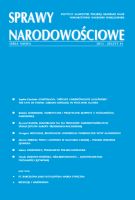Néo-bretonnants – konstruowanie tożsamości językowej przez młode pokolenie osób bretońskojęzycznych
Néo-bretonnants: the construction of linguistic identity by the young generation of Breton-speaking people
Author(s): Nicole Dołowy-RybińskaSubject(s): Cultural Essay, Political Essay, Societal Essay
Published by: Instytut Slawistyki Polskiej Akademii Nauk
Keywords: néo-bretonnants (new Breton speakers); linguistic identity; constructed identity; minority language; community
Summary/Abstract: According to statistics there are today only about 200,000 people who know the Breton language, but 70% of them are over 60 years old. However, every year more than a thousand young Bretons learn the language in schools and another several thousand adults attend language courses. It seems that in a dozen years or so the Breton language will be known almost only as a second/learned language. This paper is based on open interviews and conducted with pupils in the Diwanimmersion High School, students of the Faculty of Breton at Rennes University and Breton language learners (age of 16-25). A large majority of them come from families who have not used Breton for two generations. The reason why these young people have decided to learn the language of their ancestors and their relation to the language are studied. The Breton identity of today is not based on knowledge of the language but on the strong emotional relation to it. The relation between their Breton identity and the language is interesting. Speaking Breton is their conscious choice. It is not their first language, in which they think and feel. The central question of the paper is concerned about to what extent the identity of néo-bretonnants is based on the relation with the language as a distinguishing feature of cultural membership, and to what extent the Breton language is the medium of enforcing this selected and consciously created identity.
Journal: Sprawy Narodowościowe
- Issue Year: 2012
- Issue No: 41
- Page Range: 119-137
- Page Count: 19
- Language: Polish

